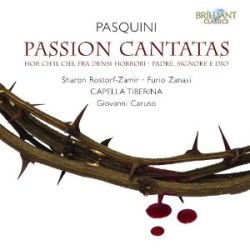|

Support
us financially by purchasing this disc from |
|
|
|
|
|
Bernardo PASQUINI (1637 - 1710)
Passion Cantatas
Hor ch'il Ciel fra densi horrori [26:09]
Padre, Signore e Dio [26:37]
Sharon Rostorf-Zamir (soprano), Furio Zanasi (baritone)
Capella Tiberina/Giovanni Caruso
rec. 2-4 October 2010, Villa Puccini, Scornio (Pistoia), Italy. DDD
Lyrics included, no translations
BRILLIANT CLASSICS 94225 [52:46]
Bernardo Pasquini is mainly known for his keyboard music. It is that
part of his output which has been most recorded. One disc with keyboard
music has been reviewed here
and here.
However, his oeuvre comprises vocal works as well; in particular a
considerable number of operas and oratorios. This bears witness to
his talent in the dramatic department which also comes to the fore
in the two cantatas on this disc.
Pasquini was educated as a keyboard player and developed into the
most prominent composer of keyboard music between Frescobaldi and
Domenico Scarlatti. He settled in Rome around 1650 and remained there
for the rest of his life. At that time Frescobaldi was already dead
but Pasquini carefully studied and copied his works. After holding
various posts as organist of several churches he became keyboard player
at the court of Prince Giambattista Borghese. Previously he had also
enjoyed close contact with Queen Christina of Sweden and the cardinals
Ottoboni and Pamphili. Pasquini participated in many performances
of secular music in Rome, regularly working with Arcangelo Corelli.
He was a sought-after keyboard teacher; among his students were Zipoli
and possibly Domenico Scarlatti, but also foreigners such as Johann
Philipp Krieger and Georg Muffat.
So far little attention has been given to Pasquini's vocal output;
most of it has never been published. He is known to have written 18
operas, 12 of which have survived; seven of his 13 oratorios have
come down to us. The two cantatas on this disc are not mentioned in
the work-list in New Grove. Strictly speaking they belong to
the genre of the cantata, but they could also be considered oratorios.
In Hor ch'il Ciel fra densi horrori the soprano and the bass
represent five different characters: Earth, Sea, Air, Moon and Sun.
The text focuses on the three hours of darkness during Jesus' crucifixion.
The five characters "are drawn into the pain and suffering of Christ,
while man remains dry-eyed (...), continuing to live in joy and delight",
Alexandra Nigito writes in the liner-notes. Padre, Signore e Dio
is a dialogue which describes how Christ triumphs over death through
his crucifixion and resurrection. If you don't know Italian you have
to content yourself with this short description, since the booklet
includes the lyrics, but without a translation.
The two cantatas begin with a short sinfonia. Then follows a series
of recitatives and arias. The latter are mostly rather short and some
of them have a rudimentary da capo structure. Because of the
lack of translations it is hard to tell to what extent the two soloists
have captured the text and its affetti. My impression is that
they both deal pretty well with dramatic character. The recitatives
are performed with the necessary rhythmic freedom, and the contrasts
in some arias come off rather well. The singing of Sharon Rostorf-Zamir
and Furio Zanasi is quite different, though. The latter makes by far
the best impression, with a strongly speech-like performance and an
impressive vocal technique. The soprano's singing is marred by an
incessant vibrato, which is the worst in some arias whose pitch causes
her trouble. The top notes in 'Miei pallori' (Hor ch'il Ciel fra
densi horrori), for instance, sound stressed and as a result this
aria is one of the least-satisfying aspects of the disc.
The instrumental scoring is for two violins and bc. "We doubled the
strings in the sinfonias and some of the ritornellos to capture the
lush and sumptuous sound of the Roman orchestras, which could include
as many as 150 instruments during performances of large-scale oratorios",
the liner-notes say. The latter seems irrelevant as these cantatas
don't fall into the category of "large-scale oratorios". Considering
the lack of a viola part it is rather unlikely that the string parts
were performed with more than one instrument per part. The violins
are not doubled here, by the way: both first and second violin parts
are performed by three players each.
The instrumentalists play well, though, and they are not the reason
that this disc isn't an unqualified success. The main ‘offender’
is the singing of Sharon Rostorf-Zamir which is not really convincing
from a stylistic point of view. On the other hand, there is no lack
of drama in these performances, and that makes this disc an attractive
proposition. The omission of a translation of the lyrics is a serious
shortcoming, though.
Johan van Veen
http://www.musica-dei-donum.org
https://twitter.com/johanvanveen
Support
us financially by purchasing this disc from |
|
|
|
|
|



 All Nimbus reviews
All Nimbus reviews








